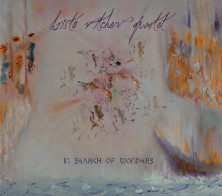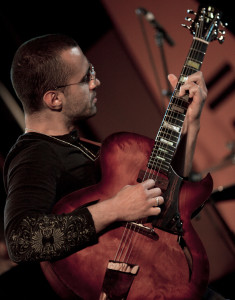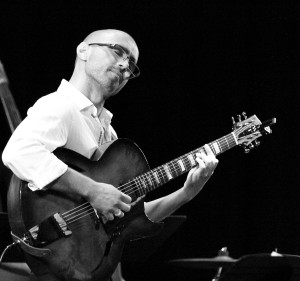
Hristo Vitchev Quartet – “In Search Of Wondersâ€
“In Search Of Wondersâ€, a two CD set, is a collection of music that is clearly all about a journey, and it’s clear that the band and composer is very passionate about that journey. The playing is great all throughout that journey, and so because of the high quality of the writing, I feel like that’s where the focus of my review will be. “The Transitory Nature†is the beginning of the trip, and it unfolds slowly but surely, and with strong lyricism. After stating the compelling melody, both Hristo’s and pianist Jasnam Daya Singh’s solos have an almost composed nature that fit perfectly into the form of the song. This kind of writing is among the best that this sub-genre of jazz has to offer with an almost classical depth rarely found, and that is a through line in this collection of music.
The second track, “It May Backfireâ€, starts with a wistful film score like piano introduction, and then shifts gears to a pounding and pulsating mode with a strong repeated melodic theme. Drummer Mike Shannon is all over his toms and cymbals dramatically, and bassist Dan Robbins adds a unique arco bowing flavor as well. Singh is truly a virtuoso improviser of a Hancock or Tyner quality, and his subtle reharmonization as he plays is of the highest level. Robbins also delivers a fantastic bass solo over the repeated main theme, standing up with any of the great bassists in modern jazz. At over thirteen and half minutes, this is the collections “tour de forceâ€, and Vitchev serves up a burning and building solo of his own, propelled by a slamming rhythm section and Jasnam’s tasteful comping. The tune is always going somewhere but always calling upon it’s themes and variations at the same time, and even in the final minute of the tune, it still has something new to say. It’s hard to write something of this scope and have it remain interesting and hang together all through out, but that’s what happens in “It May Backfireâ€.
And so, with “Post Nubesâ€, it’s time for a needed rest in a ballad, and its’ gentle waltz delivers just that. Hristo’s solo is lyrical, but uses a lot of wide spread intervals to keep it interesting. After a strong piano solo, it returns to the melody and bassist Robbins gives a wistful last comment on the piece.
“Fuchsia Brown Eyes†is the kind of sensitive ballad women hope to have written for them. It’s hard to write a really pretty and melodic tune like this and keep the true sense of the feeling while keeping enough sophistication going on to always keep your interest. The improvising always services the song rather than the egos of the players. This is the kind of jazz you can play for people that say that they don’t like jazz.
“Almost Home, Intro†is a drum solo to set up “Almost Homeâ€, the last piece on the first CD in the collection. Like the rest of the solos on the record, it’s a very musical drum solo that is definitely thematic, which you realize when you hear the opening rhythmic theme. The theme of the piece changes meter frequently, but in ways that make total sense for the listener, the sign of a master composer. Bassist Robbins plays yet another impressive “chopsy but melodic†solo, and then Vitchev roars in with his solo, with both solos being among the best of the collection. The track hits hard with its’ rhythmic theme as it hammers in it’s final chord.
CD two opens with “Falling In Orangeâ€, a catchy tune that suddenly gets deeper when the melody shifts to the piano. It is really impressive just how many colors the band gets out of its’ four instruments by their sensitive use of dynamics, and this track really illustrates that. Hristo’s solo builds to a dramatic close, and then Singh follows in kind, with another retelling of the main melody’s story twice, with a beautiful piano theme as an interlude. As bass ostinato fades the track out, with the drums improvising over the top.
I have come to think of a lot of what Vitchev’s band does as what I call the classical/jazz/Americana hybrid sub-genre that sort of came out of the ECM records era of the 70s and 80s. The bands I hear to compare them to the most is both the later Metheny Group and also the amazing and seminal Oregon, and the way that both Singh and Robbins play really remind me of their counterparts in Oregon in Ralph Towner’s piano and Glenn Moore’s bass work. It would not surprise me at all to hear that they all have extensive studies in classical as well as jazz in common.
“Old Theme†is anything but old sounding, it flies along from the start. It does have a sort of “tango-esque†standard minor blues chord progression that it is based on, but the melody and the improvising are totally modern and swinging. Everybody gets a chance to stretch out and blow in the one tune here that lifts the restrictions of a very complicated form to remember, and they even trade fours in the middle.
“It Is Here, Somewhere†slows things down, with an interesting repeated melodic statement getting interesting variations as the track develops both melodically and harmonically.
“Stay (Prelude)†is a rolling evolving exploration on the piano that promises good and interesting things to come, which the compelling melody of the beautiful ballad “Stay†totally delivers on. Hristo’s solo is sensitive and gorgeous, and Singh’s piano solo playfully trails out onto the top keys of the instrument. This really is one of the nicest ballads of its’ type that I have heard in a long while.
“Without Words, As The Full Moon Shines†starts with a quick insistent guitar phrase that is eventually spread over the piano and bass as well. That gets developed until the volume drops down so that one by one, the players can solo over the sizzling happy groove. In terms of the journey, you get a sense of them being close to where they are going, but also of having no hurry to arrive because it’s so much fun.
“The Invisible Stairway†is a sort of latin-bossa-tango feel with Shannon on brushes. Again, Hristo’s writing is all about theme and development here, with taking just the right amount of twists and turns back and forth from familiar to new territory. Vitchev’s guitar solo in the ending vamp is like a long goodbye to a friend, and then the melody does a sort of wave goodbye at the end. The final track, “We Search For Wondersâ€, is a short bittersweet postscript sort of recalling the journey and what was learned by all.
I think the most impressive thing I can say about this 2 CD set is how consistently it delivers on all levels, especially considering how long some of the tracks are. It is like a great book that has had the benefit of a state of the art editor to trim every bit of fat from it, to give you nothing but the best the music has to offer. I can tell that I will be listening to this CD a lot in years to come. I would say that they found the wonders of which they sought.
Record label: First Orbit Sounds
Link for purchase:Â http://www.cdbaby.com/cd/hristovitchevquartet2
Doug Perkins, March 31, 2016
www.jazzguitarsociety.com


